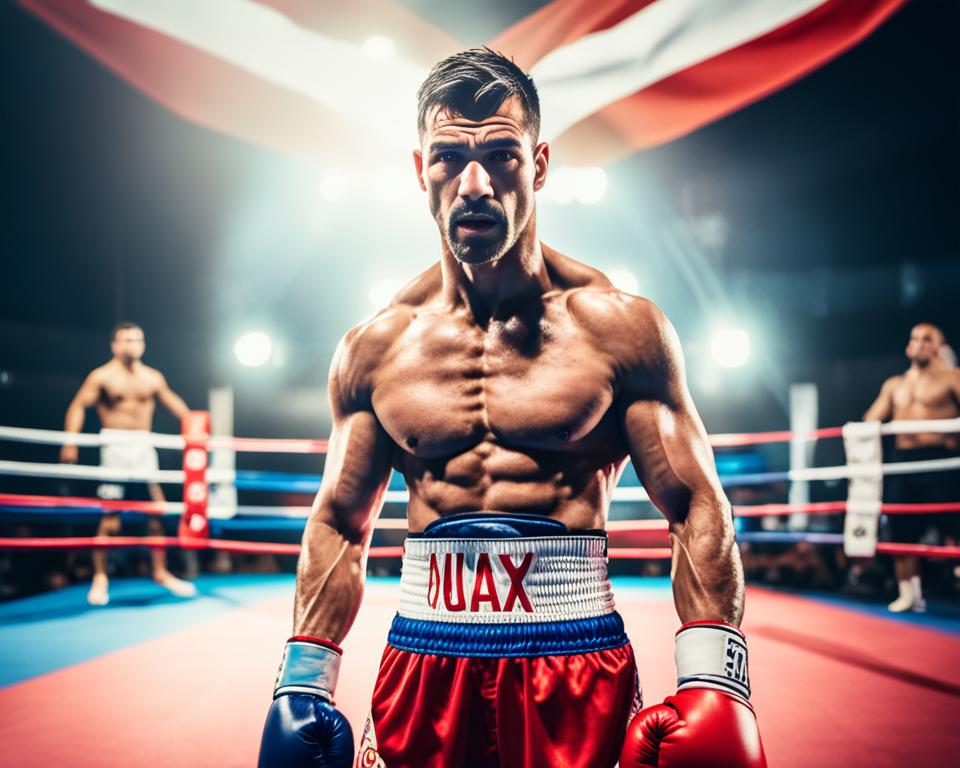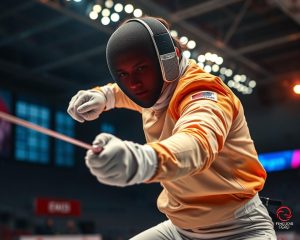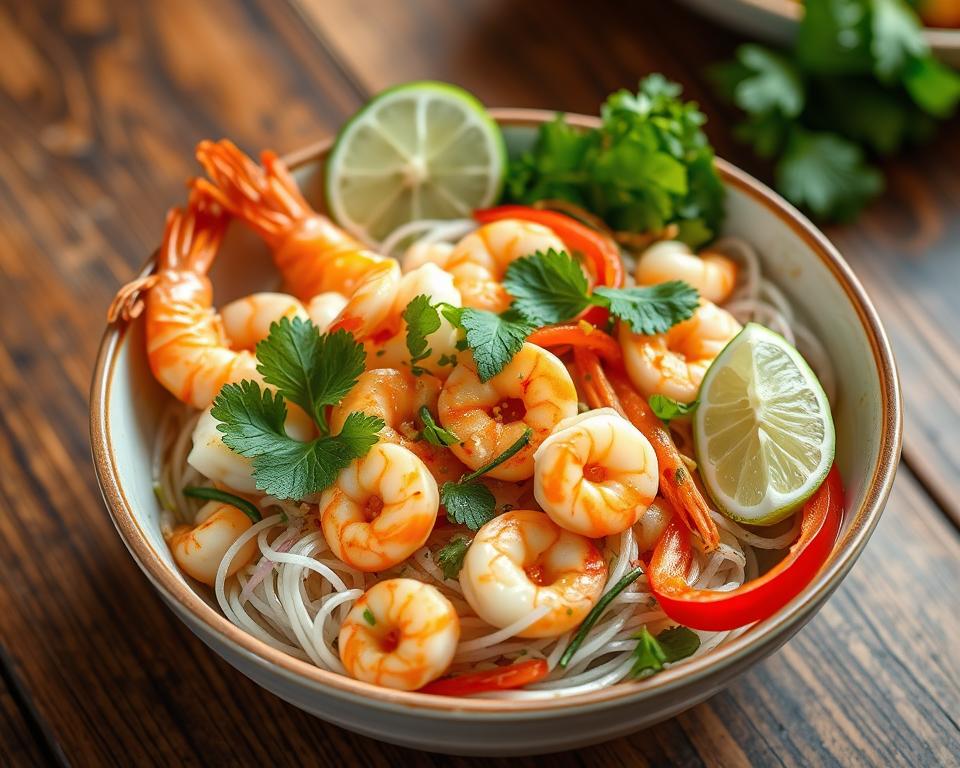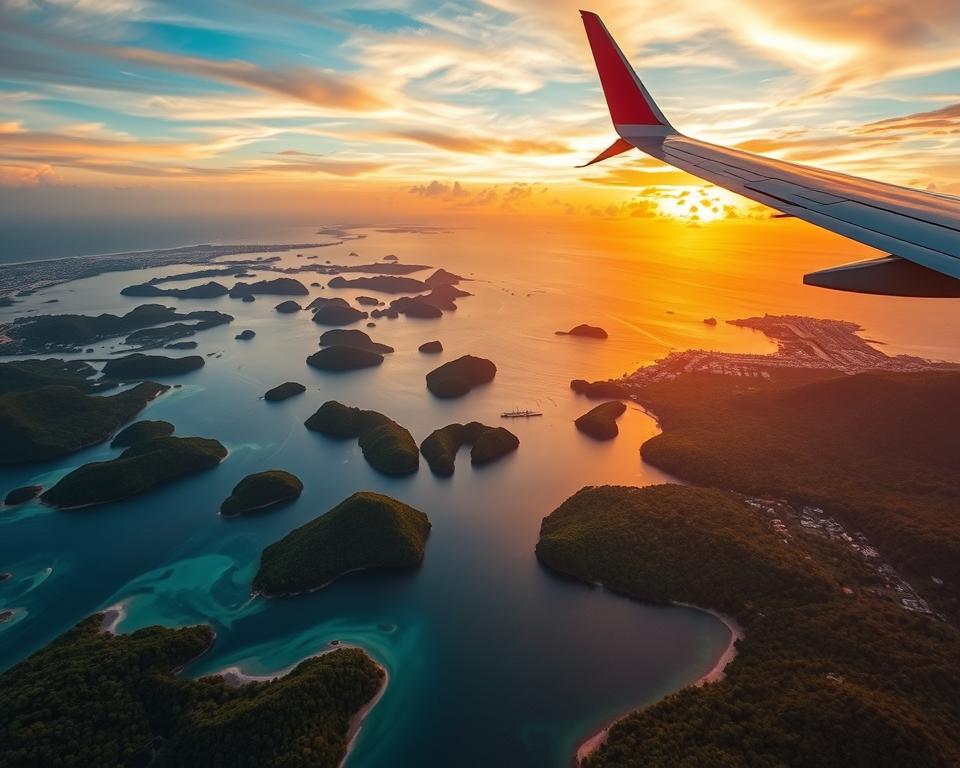Muay Thai, a martial art from Thailand, has won fans all over the world. It’s known for its strength, speed, and deep cultural roots. But, it’s not part of the Olympic Games, even though many love it. We’ll look into why Muay Thai isn’t in the Olympics and what’s being done to change that.
Muay Thai has a long history in Thai culture. It also faces big challenges to become an Olympic sport. We’ll explore the reasons it’s not in the Olympics yet and what might help it join the top sports.
Read more interesting information at ::thekitchenbookstore
Muay Thai’s Exclusion from the Olympic Games
Muay Thai, known as Thai boxing, is a top martial art but not in the Olympics. Fans and enthusiasts are surprised it’s not on the international stage. They ask why this ancient sport is left out.
One big reason Muay Thai isn’t in the Olympics is the lack of a single governing body. Unlike judo, taekwondo, and karate, Muay Thai struggles to unite under one organization. This makes it hard to push for Olympic inclusion.
| Martial Art | Olympic Inclusion | Governing Body |
|---|---|---|
| Judo | Included since 1964 | International Judo Federation (IJF) |
| Taekwondo | Included since 2000 | World Taekwondo Federation (WTF) |
| Karate | Included since 2020 | World Karate Federation (WKF) |
| Muay Thai | Not included | No single governing body |
The sport’s lack of a unified governing body and standard rules is a big hurdle. Muay Thai has many rules and variations, making it hard for the IOC to add it to the Olympics. The IOC looks for a single governing body and standard rules before adding a sport.
Despite these hurdles, the Muay Thai community is working hard for Olympic inclusion. They aim to create a unified governing body and standardize the sport’s rules. Their efforts could lead to Muay Thai’s Olympic debut in the future.
The Rich History of Muay Thai
Muay Thai, an ancient martial art from Thailand, has a long and fascinating history. It started as a way to defend oneself and has grown into a sport loved by many. This sport is deeply tied to Thai culture.
Origins and Cultural Significance
It began in the 16th century, when Thai warriors fought with their fists, elbows, knees, and shins. This form of combat became a key part of Thai culture. It helped keep the nation’s warrior spirit alive. Muay Thai is now seen as Thailand’s national sport. It’s a symbol of Thai pride and strength.
Evolution as a National Sport
Over time, Muay Thai changed from a traditional art to a modern sport. In the early 1900s, the Thai government saw its value and started to organize it. They set up rules and techniques for the sport.
Now, Muay Thai is loved and celebrated all over Thailand. Athletes compete in national and international events. These events highlight the sport’s history and cultural importance.
“Muay Thai is not just a sport, but a way of life in Thailand. It embodies the spirit and resilience of our people.”
Muay Thai’s history and cultural importance make it a special martial art. It inspires athletes and fans all over the world. The challenge is to keep its traditional values while moving into the future.
Olympic Requirements for Sport Inclusion
To be part of the Olympic Games, sports must meet strict criteria set by the International Olympic Committee (IOC). A key requirement is having a recognized international governing body. This body must oversee the sport’s growth and competitions worldwide. The sport also needs to have a big following and be part of high-level competitions globally.
Governing Body and International Presence
Muay Thai is very popular in Thailand and has a deep cultural history. But, it has struggled to meet the IOC’s Olympic inclusion standards. Muay Thai doesn’t have a single, worldwide governing body. Instead, it’s managed by various national and regional groups, each with their own rules.
The international presence of Muay Thai is not as strong as other combat sports like judo, taekwondo, and karate. These sports have a big global presence and compete in major international events. The lack of a unified governing body and limited global reach has kept Muay Thai out of the Olympics so far.
| Sport | Governing Body | International Presence |
|---|---|---|
| Muay Thai | Fragmented, no single global authority | Strong in Thailand, limited elsewhere |
| Judo | International Judo Federation (IJF) | Widespread global participation |
| Taekwondo | World Taekwondo (WT) | Widespread global participation |
| Karate | World Karate Federation (WKF) | Widespread global participation |
Challenges Faced by Muay Thai
Muay Thai has a long history and deep cultural roots. Yet, it has faced many challenges that stopped it from being in the Olympic Games. A big issue is the lack of standard rules and formats in the sport.
Varying Rulesets and Lack of Standardization
Many organizations govern Muay Thai, each with its own rules. This makes it hard for the sport to meet the International Olympic Committee’s (IOC) rules. Fighters, coaches, and fans deal with different weight classes, scoring systems, and allowed techniques. This can be confusing and not fair.
There is no single, worldwide group that oversees Muay Thai. This makes it hard for the sport to show the IOC that it’s organized enough for the Olympics.
- Challenges for Muay Thai in the Olympics
- Lack of standardization in Muay Thai rulesets
- Absence of a centralized governing body
“The lack of standardization in Muay Thai rulesets has been a significant barrier to the sport’s Olympic dreams. Unifying the rules and creating a global governing body is crucial for Muay Thai’s future inclusion.”
Fixing these issues is key for Muay Thai to get into the Olympics. It needs clear, consistent rules and a strong international governing body. These steps will help Muay Thai move closer to the world’s biggest sporting event.
Why Is Muay Thai Not in the Olympics?
Many fans wonder why Muay Thai isn’t in the Olympics. It’s a sport with a long history and fans all over the world. Yet, it hasn’t made it to the Olympic Games for several reasons.
One big reason is the lack of a single governing body for Muay Thai. Sports like judo and taekwondo have international groups recognized by the IOC. Muay Thai hasn’t been able to form a single, worldwide group. This makes it hard to set common rules and get into the Olympics.
- Varying rulesets and scoring systems across different Muay Thai organizations
- Difficulty in aligning traditional Muay Thai practices with Olympic standards
- Concerns about the sport’s perceived violence and brutality
Also, Muay Thai is very important in Thai culture. Its spiritual and ceremonial parts, like the wai kru ritual, are key to the sport. But, these might not fit the IOC’s rules for a global sport.
Still, the Muay Thai community worldwide hopes for Olympic inclusion. They’re working on a unified governing body, standard rules, and showing the sport’s cultural depth. Maybe one day, Muay Thai will join the Olympics.
The Push for Olympic Recognition
Muay Thai faces big challenges in becoming an Olympic sport. But, governing bodies and organizations are working hard to make it happen. They aim to meet the International Olympic Committee’s (IOC) rules and get Muay Thai into the Olympic Games.
Efforts by Governing Bodies
The International Federation of Muaythai Associations (IFMA) leads the charge for Muay Thai in the Olympics. They talk to the IOC, showing Muay Thai’s history, global presence, and Olympic values. They’re also making rules and improving how the sport is run to fit IOC standards.
National Muay Thai groups from all over the world are also pushing for Olympic inclusion. They talk to their national Olympic committees, asking for support for Muay Thai. They help with money and setup for the sport’s growth.
Big events and demos have helped make Muay Thai more known. At the Asian Games and other big events, Muay Thai shows off its skills and cultural value.
Even though Muay Thai hasn’t been in the Olympics before, its governing bodies haven’t given up. They keep working hard to meet the IOC’s rules. Their goal is to make Muay Thai a part of the Olympics.
Martial Arts in the Olympics
Muay Thai is aiming for Olympic recognition, but let’s look at other martial arts already in the Olympics. Judo, Taekwondo, and Karate have made it to the international stage. They show the hurdles and standards Muay Thai must meet.
Judo in the Olympics
Judo, a Japanese martial art, has been in the Olympics since 1964. It’s loved worldwide for its throws, grappling, and submissions. The sport’s global fame, strong governing body, and strict rules helped it get into the Olympics.
Being in the Olympics has boosted Judo’s popularity and inspired many athletes.
Taekwondo in the Olympics
Taekwondo, known for its fast kicks, started in the Olympics in 2000. It became an Olympic sport thanks to its global popularity, the International Taekwondo Federation’s efforts, and its cultural importance in Korea. The Olympics have made Taekwondo more popular, showing off its skill and athleticism.
Karate in the Olympics
Karate, a Japanese martial art, joined the Olympics in 2020. It became an Olympic sport because of its worldwide appeal, the World Karate Federation’s push, and its unique forms and sparring. Karate’s Olympic debut has made it more visible and recognized worldwide.
The success of Judo, Taekwondo, and Karate in the Olympics shows what matters for inclusion. Global popularity, strong governing bodies, and strict rules are key. These factors can guide Muay Thai as it seeks Olympic recognition.
The Future of Muay Thai in the Olympics
Many people see Muay Thai’s growing popularity as a sign it could join the Olympic Games. The idea of Muay Thai in the Olympics is exciting, with groups working hard to make it happen. They aim to get the sport recognized worldwide.
The World Muaythai Council (WMC) and the International Federation of Muaythai Amateur (IFMA) are key in this effort. They talk to the International Olympic Committee (IOC) to make Muay Thai an Olympic sport.
Adding Muay Thai to the Olympics could bring new challenges and chances. Sports like judo and taekwondo are already in the Olympics. Muay Thai’s unique style and cultural value could make it stand out.
The future of Muay Thai in the Olympics is still up in the air, but things look better now. Groups are working to make the rules clearer, get more countries involved, and show off Muay Thai’s history. This could help Muay Thai become an Olympic sport.
“Muay Thai has the potential to captivate audiences worldwide, and its inclusion in the Olympics could elevate the sport to new heights, both in terms of global exposure and funding opportunities.”
The Olympic future of Muay Thai depends on many factors. It’s up to the governing bodies, sports organizations, and Muay Thai fans around the world.
Benefits of Olympic Inclusion
If Muay Thai were to be included in the Olympic Games, it would bring big benefits. These include more global exposure, access to Olympic funding, and chances for Muay Thai athletes to shine on the world stage.
Global Exposure and Funding
Being part of the Olympics would make Muay Thai known worldwide. It would show off its rich culture, exciting moves, and hardworking athletes. This would not just spread the word but also encourage more people to try Muay Thai.
Olympic inclusion would also mean more money and resources. Muay Thai groups and athletes would get support from the International Olympic Committee. This would help improve the sport by offering better training, gear, and places to train.
| Benefits of Muay Thai in the Olympics | Impact |
|---|---|
| Global Exposure | Increased awareness and interest in Muay Thai worldwide |
| Funding and Resources | Improved coaching, training facilities, and overall development of the sport |
| Opportunity for Athletes | Chance to compete on the world’s biggest sporting stage and showcase their skills |
Thanks to the Olympics, Muay Thai could reach people all over the world. It would get the funding it needs and give athletes a big stage to show their skills. This would inspire new generations to follow in their footsteps.
Drawbacks of Olympic Inclusion
Adding Muay Thai to the Olympics could bring many benefits. But, it also raises worries about losing the sport’s traditional values and culture. It’s important to find a balance to keep Muay Thai’s true spirit.
Compromising Traditional Values
Muay Thai, known as the “Art of Eight Limbs,” is a big part of Thai culture. Its unique rituals, techniques, and spiritual parts are key to who it is. Making Muay Thai fit the Olympics might mean changing these important parts. This could upset fans and experts who see it as a betrayal.
The traditional Wai Kru ceremony, where fighters honor their teachers and Muay Thai, might get cut or shortened. The Olympics might focus more on winning by knockout than on the sport’s deeper meaning. This could be a big change for Muay Thai fans who value its spiritual side.
- Potential loss of traditional rituals and ceremonies
- Shift away from the sport’s philosophical and spiritual essence
- Increased focus on physical performance over cultural significance
Finding a middle ground between Olympic rules and preserving Muay Thai’s identity is tough. Groups in charge and athletes need to work together. They must make sure Muay Thai’s traditional values stay strong even with Olympic inclusion.
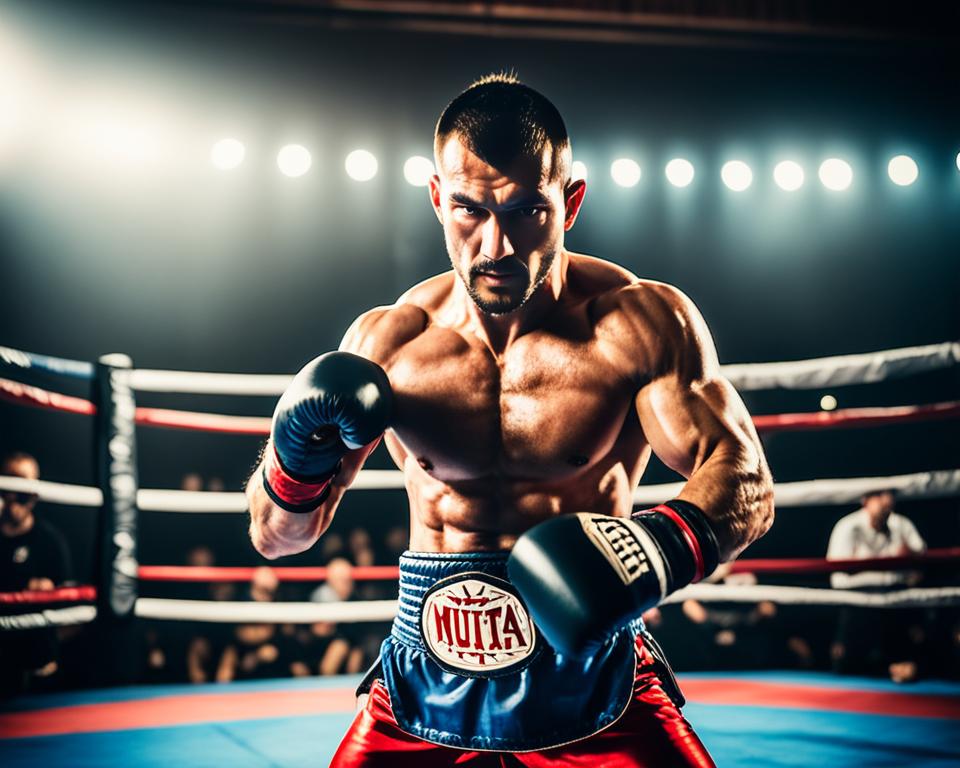
Preserving the Essence of Muay Thai
As the Olympics come closer, it’s vital to keep Muay Thai’s cultural heritage alive. This martial art is more than a sport; it’s a lifestyle with deep roots in Thai history and identity.
At its core, Muay Thai values discipline, respect, and honoring opponents. The wai kru ritual, where fighters show respect to their teachers and the sport’s history, highlights its spiritual side. The ram muay dance before a match shows the fighter’s skill and cultural bond.
“Muay Thai is not just a fighting style, it’s a way of life. The traditions and values that have been passed down must be preserved, no matter what stage the sport finds itself on.”
As Muay Thai gains more global attention, keeping its traditions alive is crucial. The sport’s leaders must make sure the true spirit of Muay Thai stays, even with new international rules.
Whether in the Olympics or not, keeping preserving muay thai traditions olympics and maintaining muay thai culture olympics is key. By respecting its history and culture, Muay Thai can continue to inspire people around the world, keeping its traditions alive for future generations.
Alternative Platforms for Muay Thai
Though Muay Thai dreams of Olympic inclusion, it has found other ways to shine. Professional leagues have become a thrilling alternative to traditional tournaments. They let athletes compete at top levels and win fans all over the world.
Rise of Professional Leagues
Professional leagues have changed the Muay Thai scene. Groups like MAX Muay Thai and Thai Fight have made the sport popular. They offer big contracts, famous events, and TV coverage worldwide.
These leagues have made Muay Thai more visible and brought practitioners together. They’ve created a strong community outside the Olympics.
Muay Thai also shines in international competitions and shows. Events like the IFMA World Championships and the Southeast Asian Games let athletes show off their skills. These events help keep Muay Thai’s cultural value alive, even without Olympic status.
The push for Olympic inclusion is ongoing, but Muay Thai’s alternative platforms are key. They keep the sport’s heritage alive and help it grow. Muay Thai fans can enjoy and celebrate the art, with or without Olympic recognition.
Embracing Muay Thai’s Uniqueness
Muay Thai is on a path to Olympic recognition. It’s important to celebrate its unique traditions and cultural heritage. Let’s focus on what makes Muay Thai special, not just its Olympic dreams.
Muay Thai is more than a sport; it’s a part of Thai life for centuries. It combines Buddhist and animistic beliefs with rituals and ceremonies. This makes Muay Thai stand out among martial arts.
The embracing muay thai uniqueness comes from its values of respect and discipline. Fighters use their fists, elbows, knees, and shins in a special way. This approach creates a unique style and philosophy in Muay Thai.
“Muay Thai is not just a sport, it’s a way of life. It’s a tradition that has been passed down through generations, and it’s a part of the cultural identity of Thailand.”
The muay thai cultural identity shows in its music, clothes, and pre-fight rituals. The Wai Kru ceremony, where fighters honor their coaches and Muay Thai, shows the sport’s deep respect for its heritage.
By valuing Muay Thai’s unique aspects, we keep the sport’s spirit alive, with or without Olympic status. Muay Thai’s true worth is in its global cultural impact, beyond just being a sport.
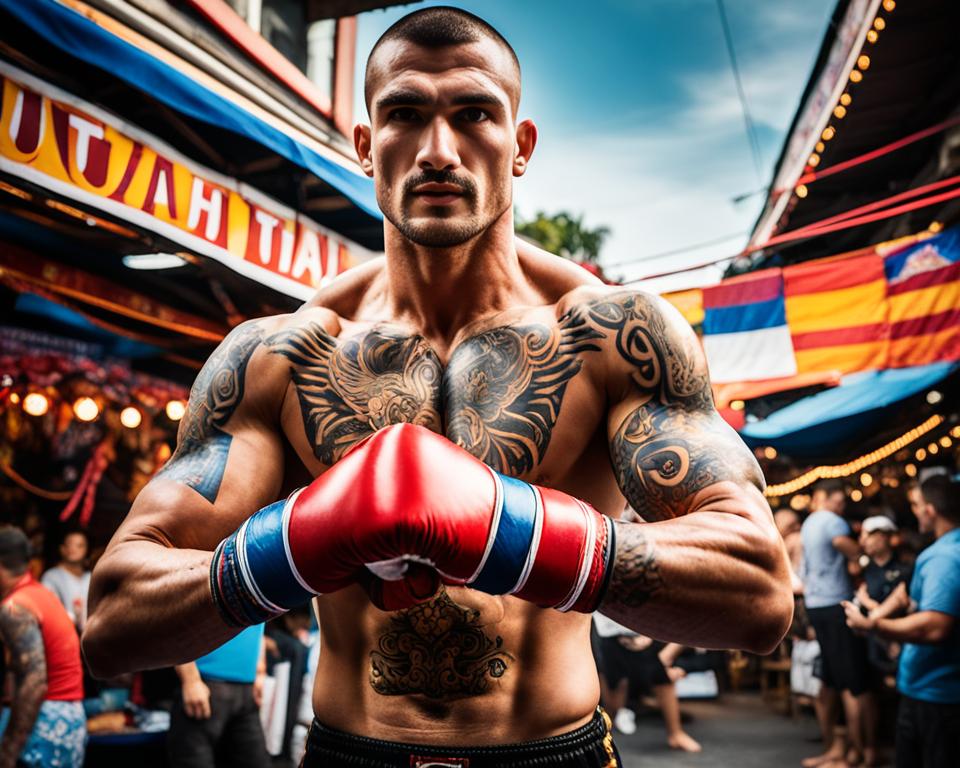
Comparison with Other Combat Sports
Looking at Muay Thai’s chance to be in the Olympics, we should see how other combat sports did it. Judo, Taekwondo, and Karate have all made it into the Olympics. Each had their own set of challenges and wins.
Judo has been in the Olympics since 1964 and has grown in popularity over the years. Taekwondo started in the 2000 Sydney Olympics, showing off its fast-paced kicks and skills. Karate, similar to Muay Thai, got into the 2020 Tokyo Olympics after a long wait.
The stories of these sports give us clues on how Muay Thai could make it to the Olympics. Things like having a strong governing body, being well-represented worldwide, and meeting the IOC’s changing rules are important. Muay Thai needs to think about these if it wants to be part of the combat sports in olympics.
As Muay Thai fans and leaders work towards Olympic recognition, they can take lessons from other martial arts. By understanding the differences between muay thai vs other combat sports olympics, Muay Thai can improve its chances of getting into the Olympics.
The Olympic Dream for Muay Thai
The dream of Muay Thai being in the Olympics has been a long-held goal for its fans. Even though it’s a popular sport worldwide, it hasn’t been in the Olympics yet. This has made many practitioners and fans upset. But, the dream of Muay Thai being in the Olympics keeps pushing forward, inspiring new champions.
Getting Muay Thai into the Olympics has been hard. There are many reasons, like making rules the same everywhere and getting more countries involved. But, the Muay Thai community has always kept going, showing their strong will.
Being in the Olympics would be huge for Muay Thai. It would mean more people seeing the sport, more money for it, and a chance to share its culture and martial arts with the world. For those who practice Muay Thai, being in the Olympics would be the top achievement.
The fight to get into the Olympics is ongoing, and the Muay Thai community is full of hope and action. They’re working hard to get past the hurdles, talking to the International Olympic Committee, and showing why Muay Thai is special. The journey is long, but the olympic dream for muay thai is strong, thanks to everyone’s hard work and passion.
“The quest for muay thai’s quest for olympics is not just about winning medals; it’s about honoring the legacy of a centuries-old martial art and sharing its transformative power with the world.”
Muay Thai is growing and winning fans all over the world. This keeps the dream of being in the Olympics alive. Every year, the Muay Thai community gets closer to their goal, opening the door to more recognition and growth worldwide.
Conclusion
We’ve looked into why Muay Thai isn’t in the Olympic Games yet. This martial art has a deep history and cultural importance. Despite being loved worldwide, Muay Thai has faced hurdles to get into the Olympics.
Things like different rules and a need for more international support make it hard. Yet, adding Muay Thai to the Olympics could bring more fans and money. But, it could also change the sport too much.
Deciding if Muay Thai should be in the Olympics is tough. It’s about wanting recognition and keeping the sport true to itself. Even if it doesn’t make it to the Olympics, Muay Thai’s impact will keep inspiring people everywhere.
